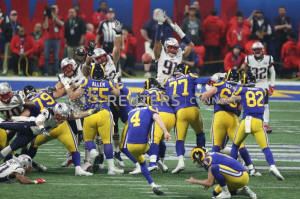|
Film
Study: How the Patriots finished the Rams
 Send a link to a friend
Send a link to a friend
 [February 05, 2019]
The New England Patriots cracked
the Los Angeles Rams' defense in Super Bowl LIII by running the
exact same play three times in a row. [February 05, 2019]
The New England Patriots cracked
the Los Angeles Rams' defense in Super Bowl LIII by running the
exact same play three times in a row.
New England ran the play out of its heaviest, non-goal line package.
Strange as it sounds, the simple formula proved to be the antidote
against an otherwise ferocious defense.
Wade Phillips' unit hounded Tom Brady and the passing game almost
all night. The Rams pestered the 41-year-old with myriad looks,
timely coverage rotations and sporadic spurts of pressure, forcing
poor reads, bad decisions, errant throws and even an ugly
sack-fumble.
Almost all of Brady's success came through Julian Edelman, who was
named MVP, and occasionally Rob Gronkowski. Elsewhere, the Rams
rendered the Patriots' auxiliary passing-game weapons nearly
useless.
To all other targets, Brady went 5 of 16 for 34 yards and an
interception. Chris Hogan failed to catch any of his six targets,
with one intercepted and another nearly picked. Phillip Dorsett --
who caught a 29-yard TD two weeks ago -- played sparingly and wasn't
targeted. Even James White was shut down, catching just one of his
four targets for 5 yards.

With no supplementary weapons helping in the passing game, the
Patriots essentially took them off the field for the biggest drive
of the game, instead favoring run-heavy personnel in order to throw
the ball. That sounds counterintuitive, but it worked perfectly
because it reduced Phillips' defensive options and gave Brady the
clearest possible picture of the defense.
In today's pass-happy NFL, defenses use base personnel so little
that most install only a few coverages out of it, sticking to basic
man and zone calls with little disguise. This has been one of
Phillips' few problem areas in recent seasons -- teams have forced
his defenses into base personnel, spread it out and thrown the ball.
The Falcons and Patriots both did this with great success against
Phillips' Broncos in 2016.
With the Lombardi Trophy on the line Sunday, New England did the
same on the game-winning touchdown drive, picking the Rams apart for
67 yards on four straight passes.
The Patriots opened the series with a crafty design.
With 21 personnel (two backs, one tight end, one wideout) in an
I-formation, Edelman motioned left to leave Gronkowski as the only
receiver to the right side. Edelman's motion confirmed man coverage,
and L.A.'s alignment meant only safety John Johnson or edge rusher
Samson Ebukam could cover Gronkowski. At the snap, Gronkowski
blocked Ebukam, who naturally assumed -- as did Johnson -- it was a
run. Johnson flew downhill and Ebukam fought upfield, only to find
Gronkowski leaking out for an easy 18-yard catch.
Then New England went empty with 22 personnel (two backs, two tight
ends, one wideout) and ran "Hoss Y Juke" back-to-back-to-back,
flipping the formation on the second play and changing the motion on
the third. The play calls for two curls on the outside (run by Rex
Burkhead and James Develin), two seams up the slot -- by Gronkowski
(inside Burkhead) and Allen (inside Develin -- and an option route
by Edelman from the slot inside of Allen.
On the first, Burkhead's motion from the backfield showed Brady the
Rams were playing Cover-4 zone (also called quarters), with four
deep and three underneath. The seams and curls completely cleared
out the middle of the field and isolated Edelman on linebacker Cory
Littleton, who had no chance amid so much space. Edelman picked up
an easy 13 yards.
The Rams adapted on the next snap, playing a matchup Cover-3 zone
but sending two underneath defenders to jam Edelman and having
another jam Gronkowski as Mark Barron carried his seam vertically.
His preferred options taken away, Brady still got 7 easy yards by
checking down to Burkhead under Marcus Peters' cushion.
Phillips ran matchup zone on the next snap, too, but motion -- this
time Edelman instead of Burkhead -- created confusion, as Littleton
and safety Lamarcus Joyner both moved to align over Edelman. Joyner
quickly corrected Littleton, but the linebacker was late returning
to where he should be -- over Gronkowski -- giving the tight end a
headstart up the seam. Brady held the centerfield safety with his
eyes, then dropped it over Littleton for 29 yards, setting up the
game-winning 2-yard TD.

Perhaps most striking about this sequence was how easy it was.
Gronkowski's first catch was a one-read throw that was all but
guaranteed to be open. All three plays out of empty defined Brady's
read either before the snap or immediately after it and produced
wide-open targets.
And it was all facilitated by run-heavy personnel, even though no
runs were called.
-McCourty's miracle
Of course, the Rams' defensive efforts still should have been enough
for a victory, if the offense could have just found the end zone
twice.
But L.A.'s best chance at paydirt was thwarted by the lesser
heralded McCourty twin, cornerback Jason McCourty, who spent 2017 on
the winless Browns and was playing in his first postseason.
With 3:42 left in the third quarter, the Patriots called Cover-4,
against a Rams formation featuring three receivers bunched right of
the line and Brandin Cooks alone on the left. Off play-action,
Cooks' seam route perfectly bisected the deep zones of cornerbacks
Stephon Gilmore (outside) and Jonathan Jones (inside), and Gilmore
tried to pass Cooks off to Jones.
However, Jones was trained on a deep crosser from Robert Woods, who
had come from the bunch formation. In Cover-4 against trips, the
backside "safety" (played by a cornerback in Jones, in this case) is
responsible for vertical routes from the trips side of the
formation, which is why Woods drew his attention. As a result, Cooks
came absolutely wide open in the end zone.
Then McCourty came to the rescue.
The other two Rams in the bunch formation stayed in to block,
leaving McCourty no receiver near his deep zone (outside to the
offense's right). But rather than sitting around, he went looking
for work, reading Jared Goff's eyes and spying Cooks open in the end
zone. As Goff released the ball, McCourty was still outside the
numbers at the 7-yard line, with Cooks on the far hash at the 3.
Somewhat miraculously, the cornerback closed the gap just in time,
arriving to jar Cooks' arms in the back of the end zone.
The late intervention wound up saving four points, as L.A. settled
for a field goal and a tie instead of taking a 7-3 lead.
-Goff the goat
As great a play as it was though, McCourty never should have had the
chance.
Goff had just two routes to read, and he was looking right at Cooks
when the wideout -- who put his arm up to call for the ball while
crossing the 13-yard line -- sprung completely free. Despite his
target coming wide open and on-time by design, Goff inexplicably
took three hitches from the top of his drop before throwing.
[to top of second column] |

The New England Patriots try to block a 48-yard field goal attempt
by Los Angeles Rams kicker Greg Zuerlein (4) with five seconds left
in Super Bowl LIII at Mercedes-Benz Stadium. Mandatory Credit: Jason
Getz-USA TODAY Sports

Even then, it still should have been a touchdown. The throw was
wobbly and too high, hanging in the air, and thrown unnecessarily
out in front of Cooks instead of right on him or to his back
shoulder. McCourty needed every bit of Goff's help to make the play.
More damning for Goff is that he should have known Cooks would be
open. The Rams ran the same play with 4:19 left in the first quarter
-- out of 11 personnel (instead of 12) and with a different run
fake, but otherwise identical -- against the same coverage and it
worked, freeing Cooks from Gilmore by 3-4 yards. Goff appeared to
think about throwing to Cooks before hesitating, and then pressure
forced him to throw it away.
The second time around, Goff should have known exactly what to
expect. The design worked even better, with Cooks even more open.
Goff had more time and space in the pocket. But for whatever reason,
he still failed to make the play.
Unfortunately for the Rams, it was far from the only play Goff would
want back.
The third-year signal-caller struggled to see things clearly
throughout the evening. He threw two would-be interceptions that
were dropped -- the first could have been picked by Devin McCourty
OR Jonathan Jones if John Simon had not batted it at the line --
then botched the aforementioned play to Cooks, and finally made
three critical errors in the fourth quarter.
On second-and-22 with 10:36 remaining, Goff failed to spot a likely
40-plus-yard gain. The Rams ran a "dagger" concept with Woods'
vertical route clearing out space for Josh Reynolds' dig (the
primary option on the play), which came wide open against the
Patriots' Cover-3 zone, with nobody within 10 yards of Reynolds. For
whatever reason -- perhaps a predetermined decision -- Goff instead
opted for Cooks' out-and-up on the far side, which was blanketed by
Gilmore.
On the next series, Goff went for the tying touchdown on a fade to
Cooks and actually threw a terrific pass, dropping it in the bucket.
But he failed to hold the single-high safety (Duron Harmon) long
enough with his eyes, and Harmon was able to break to Cooks' route
(which came from a tight split) and help dislodge the ball.
Cooks still could have caught the pass -- and Gilmore sneakily
hooked one of the wideout's arms before it arrived -- but he very
well might have hung on if not for a crushing hit from Harmon, whom
Goff could have removed from the play with his eyes.

One play later, Goff all but sealed the defeat with a poor decision
against 0-blitz, the Patriots' first time all game sending six or
more rushers. After showing a few 0 looks on earlier third downs but
having Harmon bail to play free safety, New England brought them all
this time, and Harmon came unblocked up the middle. With no short
hot route available, Goff looked to Cooks' vertical pattern but
threw early and without definition, well before the receiver had the
chance to turn and find the ball. With eyes on Goff the whole way,
the 6-foot Gilmore easily elevated over the 5-foot-10 Cooks for the
pick.
It wasn't all bad from Goff, who made a few outstanding throws in
the game. None was better than the 18-yarder to Woods on third-and-6
-- one play before McCourty's miracle break-up -- as Goff fired a
bullet past Jones' tight man coverage despite Trey Flowers barreling
into his face.
But the missed opportunities were crushing, especially in a
low-scoring game that was there for the taking.
-Brilliant Belichick does it again
Naturally, Belichick deserves plenty of credit for Goff's struggles.
His game plan was geared toward exposing the quarterback's
weaknesses by shutting down the run game and taking away easy
play-action completions.
Up front, the Patriots used primarily five- and six-man fronts --
with only one linebacker off the ball -- and played aggressively
uphill against the run. Extra men on the line created more single
blocks, and penetration forced cutbacks into the waiting arms of
other defenders. Belichick also employed various run blitzes and gap
exchanges to distort the Rams' zone-blocking assignments. Neither
Todd Gurley nor C.J. Anderson found much daylight, with 57 yards on
17 carries between them (16 of which came on one play).
As we suspected in our preview, Belichick followed the lead of Matt
Patricia's Lions (and other teams that gave the Rams fits late in
the regular season) by playing plenty of Cover-4 on early downs. The
deep zones combined to double-team many of the Rams' deep route
combinations off play-action, limiting explosive plays. Goff wound
up holding the ball, checking down, throwing it away or forcing it
into coverage, as he did on Dont'a Hightower's dropped interception
to open the second half.

A better showing from New England's offense would have forced Los
Angeles to throw even more, but the Rams still wound up in plenty of
obvious passing situations, putting all of the burden on Goff.
That's exactly what Belichick wanted, and he made the 24-year-old
miserable with an endless array of stunts, twists and blitzes,
exactly like he did against Patrick Mahomes in the AFC Championship
Game. None used more than five rushers -- until the 0-blitz call on
Gilmore's interception -- and many required only four. Hightower and
Kyle Van Noy alternated between leading stunts and looping around
the slants of defensive linemen, leaving the Rams' highly touted
offensive line helpless as it tried to pick up the weaving rushers.
The Patriots ultimately racked up four sacks and 12 QB hits, giving
them eight and 21, respectively in the final two playoff games. This
from a defense that had only 30 sacks (tied second fewest in the
NFL) and 100 QB hits in the entire regular season.
The suddenly terrifying pass rush was just another example of
Belichick's uncanny chameleon-like qualities, shaping his defenses
to fit the opponent and deliver in critical moments.
--David DeChant, Field Level Media
[© 2019 Thomson Reuters. All rights
reserved.] Copyright 2019 Reuters. All rights reserved. This material may not be published,
broadcast, rewritten or redistributed.
Thompson Reuters is solely responsible for this content. |